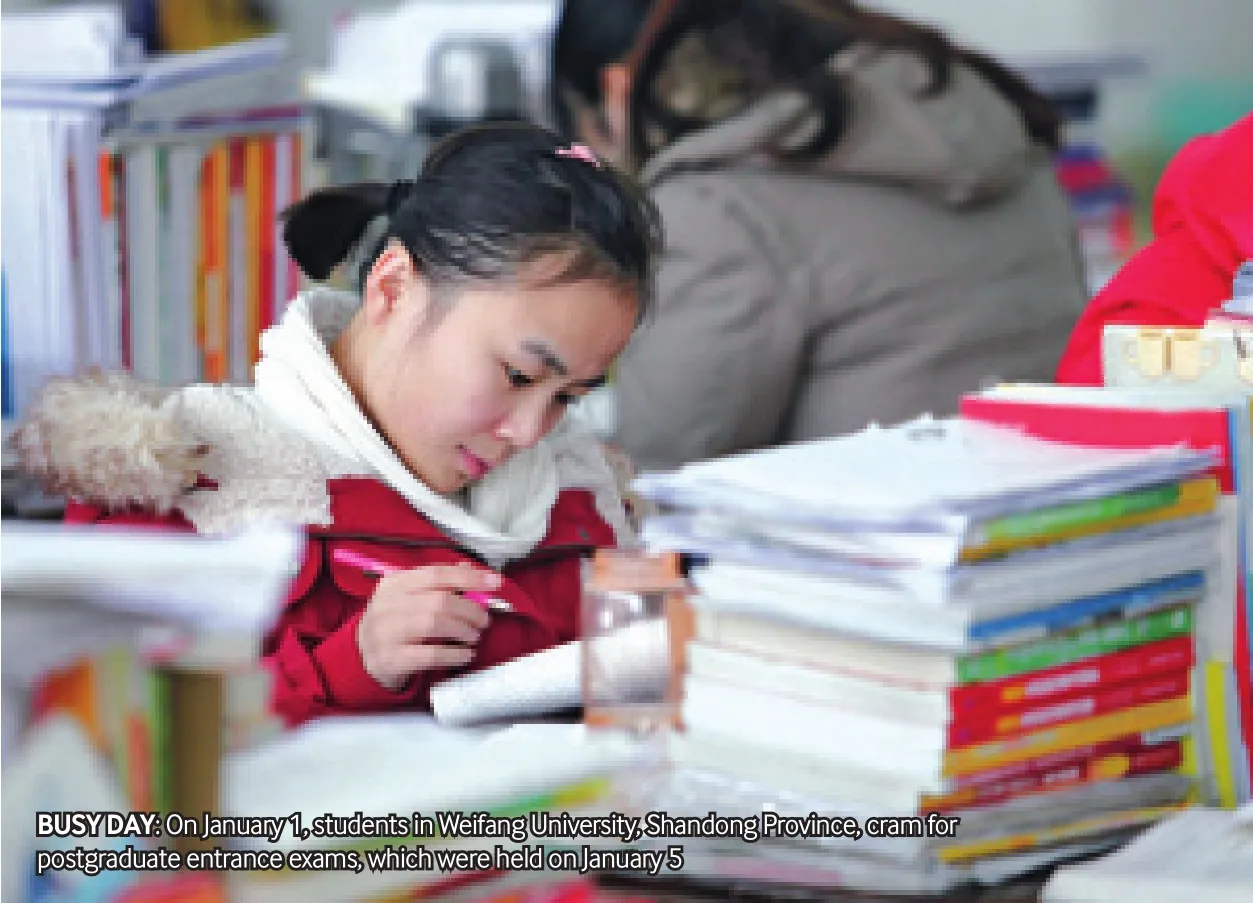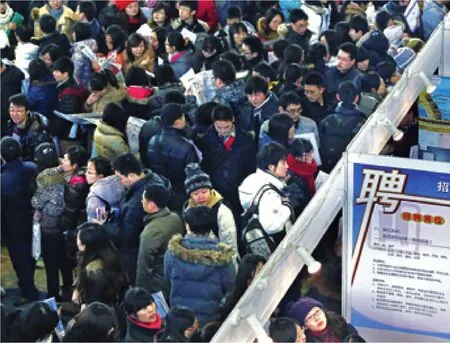Too Well Educated Having long suffered from low education, Chinese job seekers now face a problem of an opposite nature
2013-12-06ByWangHairong
By Wang Hairong
Wang Lina, who holds a master’s degree from Wuhan University in central China’s Hubei Province, once firmly believed that the qualification would land her a stable and highly-paid job.
Yet after failing to nail down a job after attending more than 40 job fairs since graduating last summer, her con fidence is waning.She managed to get her foot in the door at a well-known real estate development company in Wuhan, the provincial capital. However,she was turned down after an interview for being overqualified.
Grim prospects for master’s degree holders presented Wang with a dilemma: Holding out for a long shot at a position suiting her advanced academic qualifications, or omitting her postgraduate credentials from her resume and seek employment as a humble baccalaureate. Wang chose the latter.
Six decades ago, eight out of 10 Chinese people were unable to read and write. Now the country faces a different conundrum: A growing number of people in economically developed regions blame their job-hunting difficulties on a surplus of education.
Degree depreciation
University students were rare in China when the government launched its reform and openingup policy and resumed the national college entrance examination in the late 1970s. Of ficial data show that in 1977, only 3.4 percent of applicants were admitted into regular institutes of higher learning.
A university degree can dramatically change a person’s future, especially for rural students. In the 1980s, university graduates were assigned jobs, usually decent ones in cities, by the government.
Since 1999, the government has dramatically expanded university enrollment.Statistics from the Ministry of Education show that in 1998, 1.08 million students, or 34 percent of those taking the national college entrance examination, were admitted into undergraduate programs. In 1999, 1.6 million students,or 48 percent of applicants,were accepted.Enrollment continued to rise through 2012,when 6.85 million students,or 75 percent of applicants,entered universities.
The Ministry of Education issued a regulatory circular last year announcing an end to the expansion of undergraduate enrollment.
The sharp increase in university enrollment has resulted in a large number of graduates competing for a limited amount of white-collar jobs. The China Labor Market 2012 Report released by Beijing Normal University last November revealed that currently, a surplus of college graduates and a shortage of migrant workers doing physical work coexist in the labor market.
Meanwhile, enrollment in graduate programs has risen too. Data from the Ministry of Education show that enrollment in postgraduate programs doubled since 2003,reaching 584,000 students in 2012.
In recent years, master’s degree holders have faced an increasingly tight job market.Official statistics exhibit that from 2009 to 2011, the employment rate of fresh master’s degree holders was below that of bachelor holders.
As a result, a number of master’s degree holders in China have raised eyebrows by competing for manual jobs that conventionally do not require university education.

Last September, Harbin in northeastern Heilongjiang Province advertised 457 vacancies for sanitation workers, including 307 drivers of waste collecting vehicles, 30 car maintenance personnel and 120 cleaners.Applicants were required to have at least two years’ college education and be under 30 years old.
The recruitment advertisement promised that recruits who show outstanding performance for three years in a row would be given priority when applying for management or professional positions in the sanitation sector later.
These vacancies drew 11,539 applicants,29 of whom hold a master’s degree, reported Heilongjiang Daily.
In Beijing, employers thought that 48 percent of their employees had received too much education for their jobs, whereas 54 percent of employees believed they are overeducated, according to the China Labor Market Report 2012.
“Overeducation occurs when one’s education level is above that required byone’s job,” said Lai Desheng, the report’s lead author and Director of the School of Economics and Business Administration at Beijing Normal University.

Lai said that the rapid expansion of higher education in the past decade or more is both a challenge and opportunity.On one hand, the sudden influx of millions of university graduates into the job market make it difficult for many graduates to find a satisfactory job; and on the other, if people with advanced educations and intelligence are put to good use, they will fuel sustained economic growth and turn China into an innovative country.
“Not being able to put what one has learned into practice is a tremendous waste,” said Wang Zhongwu, a professor at Shandong University. “China is developing and needs a large number of well-educated laborers.”
Uneven distribution
Over education has also been experienced by developed countries, yet the overall education attainment of Chinese people is still low in comparison with that of most developed countries.
In China, the percentage of the working population with at least two years’ college education was 10.05 percent in 2010, up from 4.66 percent in 2000, said the China Labor Market Report 2012.
Whereas, in 2010, the average proportion of population aged 25-64 that received tertiary education (college education or above)was 30 percent in member countries of the Organization for Economic Cooperation and Development (OECD) and 26 percent in Group of 20 countries, according to the 2012 edition of Education at a Glance published by the OECD last September. The report revealed that the proportion was 54 percent in the Russian Federation, 42 percent in the United States and 45 percent in Japan.
The concurrency of low overall tertiary education attainment level and the overeducation phenomenon in China results from uneven distribution of college educated people and the country’s economic structure, the report said.
Accordingly, in the past decade, about 88 percent of college graduates took up jobs in urban areas, while only 12 percent or so obtained employment in rural areas; more than half of college graduates flocked to China’s eastern regions, which are economically more developed.
Song Xiaowu, head of the China Society of Economic Reform, told a press conference last November that most of the postgraduates he taught were from county seats, yet after graduation, almost all settled in large cities such as Beijing or Shanghai rather than returning to their hometowns.
Higher education attainment in some large Chinese cities is comparable to that in developed countries. For instance, the sixth national census of China in 2010 found that 6.18 million Beijing residents and 5.05 million Shanghai residents had received a two-year college education or more, accounting for 31.5 percent and 21.9 percent of local permanent population, respectively. If adjusted for population aged 25-64, the proportion would be even higher.
The 2012 China Labor Market Report said that the incidence of over-education in government organizations and state-owned companies was higher than other sectors. It is mainly because government departments and state-owned enterprises are not as sensitive to labor costs.
Given China’s current economic structure, the labor market can only absorb a limited amount of highly educated workforce, wrote Wang Huachun, a faculty member of the School of Economics and Business Administration at Beijing Normal University.
In 2011, primary industry’s value added accounted for 10.1 percent of China’s GDP,that of secondary industry accounted for 46.8 percent and that of the tertiary industry for 43.1 percent, according to the annual Statistical Communiqué released by the National Bureau of Statistics.
Yet China’s industries including the tertiary are more labor-intensive than knowledge-intensive. The weights of hi-tech industries and the knowledge-based service industry are still quite low, he said.
There is a mismatch between the skills supplied in the labor market and those in demand, Wang Huachun said. “As a result,some college graduates cannot find jobs easily, whereas some vacancies can not be filled readily,” he said.
He suggested that China’s economic structure should be upgraded so that more employment opportunities will be available to a highly educated labor force.
Yang Weiguo, Deputy Director of the Employment Research Institute at the Renmin University of China, said that the education system should also be revamped to ensure its graduates meet current and changing needs in the labor market and avoid waste of investment in education. ■
